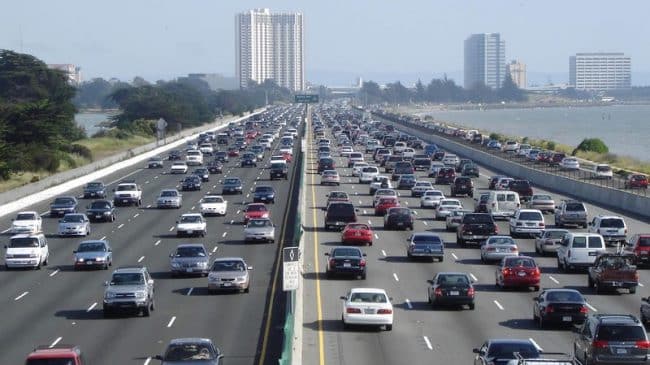For the past year, politicians have fanned out across the state to argue for more transportation funding. During the current special legislative session, state Sen. Jim Beall, D-San Jose, and Assemblyman Jim Frazier, D-Oakley, have introduced plans to raise $7.4 billion for transportation funding, mostly by raising the gas tax 17 cents a gallon.
Transportation infrastructure is inarguably a critical part of California. But many lawmakers are rightly skeptical of claims that more money will solve the problems. As state Sen. John Moorlach, R-Costa Mesa, put it last year, “It’s a tragedy that Californians pay the highest transportation taxes and have the worst roads to show for it.”
California has several problems, most notably its system for funding transportation projects and its administrative processes are stuck out of date and ineffective. California’s primary funding mechanism for roads is the gas tax, which has been a somewhat reliable source in the past – when it wasn’t being diverted to non-transportation uses. But, like an aging rock star whose voice and hips are struggling on a farewell tour, the gas tax has seen better days. The fuel tax is losing its purchasing power due to inflation and growing use of newer, more fuel-efficient vehicles that can travel many more miles on a single gallon of gas. Not to mention electric vehicles, which don’t use gas and thus don’t pay gas taxes, but do wear out road surfaces just as much as gas tax payers.
California is testing a pilot program for mileage-based user fees, which would replace gas taxes with a per-mile fee. Mileage fees are fair – the user pays, and they could provide reliable stream of revenue to maintain and build roads. However, it will be a decade before mileage-based user fees can be expected to fully replace gas taxes, so there are other steps California can take in the interim.
In 2010, Gov. Arnold Schwarzenegger and legislators crafted a complex fuel tax swap so they could divert highway funds to prop up the general fund. The state should ditch the fuel tax swap and ensure that gas tax money cannot be used for non-transportation purposes.
And while the Legislature sorts out funding issues, Caltrans needs to get its management and spending in order. To put it simply, Caltrans is overstaffed. In 2015, Texas’ Department of Transportation had around 10,000 employees while Caltrans had more than 17,000 employees.
Despite having fewer employees to care for it, the Texas state road system – 80,000 state-controlled miles – is four times larger than California’s, which has 19,000 state-controlled miles.
Salaries are another concern. When Caltrans last participated in a salary survey, its average salary was the highest in the nation, 20 percent more than the next highest state.
Most other states reduce transportation costs by contracting-out maintenance work and entering into design-build and public-private partnership projects that require less state involvement. Instead of doing everything with state workers, these states tap the expertise available in the private sector. Yes, other states also have highly paid staffers who design key projects, identify problems, monitor progress and make sure contractors deliver as promised so taxpayers are protected. But they do not maintain an expensive army of in-house engineers the way Caltrans does.
Reason Foundation’s Annual Highway Report found California spends $47,000 on administrative costs for every mile of state-controlled road it has. And in total – factoring in administration, maintenance and other costs – California spends over $400,000 per state-controlled mile of road. Texas, in contrast, spends less than half that – $177,000 per mile.
California’s roads definitely need improvement. Existing roads need to be maintained and upgraded. Deficient bridges need repair. Highways, especially in urban areas like Southern California, need to be expanded. But before raising taxes and fees, California should fix its broken and bloated transportation bureaucracy, which siphons off far too much money that should be used to fix roads.
Baruch Feigenbaum is a transportation policy analyst at Reason Foundation.

